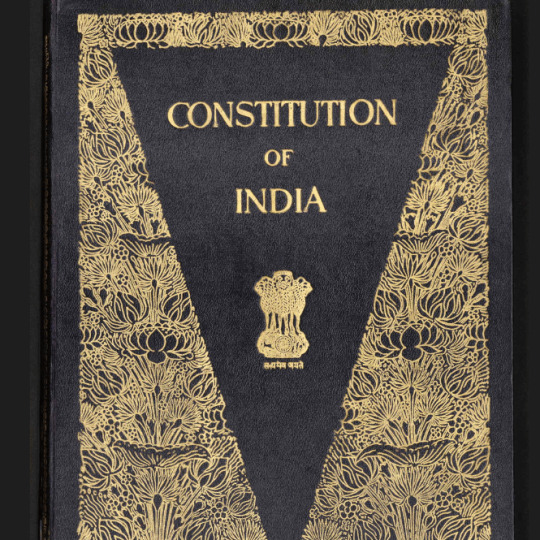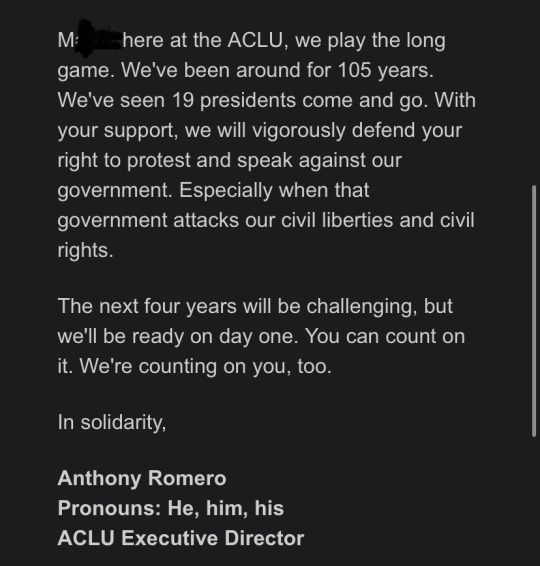#LEGAL EDUCATION
Explore tagged Tumblr posts
Text
Article 20 of the Indian Constitution: Safeguarding the Rights of Individuals
Introduction Article 20 of the Indian Constitution is a crucial provision that plays a significant role in safeguarding the fundamental rights of individuals. It embodies the principles of justice and fairness by ensuring protection against certain actions that may infringe upon the personal liberty of citizens. This article provides safeguards that are vital for upholding the principles of a…

View On WordPress
#Article 20 of Indian Constitution#Constitution of India#Constitution Studies#Constitutional Insights#Fundamental Rights#Indian Constitution Explained#Indian Law#Indian Legal System#Legal Education#Legal Rights
2 notes
·
View notes
Text
A Pragmatic and surprisingly comforting perspective about the Trump 2nd Presidency from the ACLU
***Apologies if this is how you found out the 2024 election results***
Blacked out part is my name.




I’m not going to let this make me give up. It’s disheartening, and today I will wallow, probably tomorrow too
AND
I will continue to do my part in my community to spread the activism and promote change for the world I want to live in. I want to change the world AND help with the dishes.
And I won’t let an orange pit stain be what stops me from trying to be better.
A link to donate to the ACLU if able and inclined. I know I am
#us politics#donald trump#election 2024#aclu#a promise to myself#how is this comforting you May ask#bc we are not fighting alone or uninformed#we have good and strong groups in our corners defending what we believe in#it’s not over yet#we have to try and pushback#added Alt image descriptions since this is leaving containment#happy to see many engaging with this to either donate time or money or both#really warms the cold heart of mine#wow this broke containment#overall it’s been pretty nice seeing people engaging with it ready to roll up their sleeves and get to work#they did the travel ban right at the beginning of the previous presidency too#also every major civil battle in the last century#brown V board of education- the one that desegregated schools#loving V Virginia- legalized interracial marriage#roe V wade- legalized abortion#United States V Nixon- watergate scandal WHICH LIMITED US PRESIDENTAL POWER#Edwards v. Aguillard- helped allow schools to teach evolution#Planned Parenthood v. Casey- another abortion case#ACLU v. NSA- to stop the NSA spying on wikipedia users#Ingersoll v. Arlene's Flowers- fought to stop LGBTQ discrimination from businesses#Obergefell v. Hodges- case that legalized gay marriage#literally WAY MORE GUYS#so don’t fall into dispair! these are literally one of the good ones!
26K notes
·
View notes
Text
The Forgotten Shield: Understanding the Ninth Amendment’s Power and Silence
The Enigmatic Ninth Amendment: An Introduction When most Americans discuss constitutional rights, they are likely referring to the First, Second, Fourth, or even the Fifth Amendments. The Ninth Amendment, by contrast, is hardly ever mentioned in everyday civic conversation—or even in law school lectures. Yet, its inclusion in the Bill of Rights was not accidental. It was deliberate, even…
#American government#american history#Bill of Rights#bodily autonomy#civic literacy#civil liberties#constitutional law#constitutional rights#constitutional scholars#digital privacy#forgotten amendment#Griswold v Connecticut#James Madison#JT Santana#jtwb#jtwb768#judicial interpretation#judicial restraint#legal education#legal philosophy#legal theory#natural rights#Ninth Amendment#originalism#personal liberty#privacy rights#scotus#unenumerated rights#us constitution
1 note
·
View note
Text
Private citizens should be able to draw up their own contracts in front of a notary and/or a camera and have it hold up in court, as long as it's not nonsense! Lawyers are expensive, and should not have to get involved in simple personal matters! Law education for all, starting in elementary school!
0 notes
Text
Top Law Schools in Africa
Topic: Top Law Schools in Africa: A Comprehensive Guide Africa is home to several prestigious law schools that offer world-class legal education and training. These institutions are renowned for their rigorous academic programs, distinguished faculty, and strong emphasis on practical skills development. This article aims to provide a comprehensive guide to the top law schools in Africa,…
#AFRICA#Faculty of Law#Legal Education#LLB#LLM#School of Law#Top Law Schools#University of Cape Town#University of Ghana#University of Nairobi#University of Pretoria#University of the Witwatersrand
0 notes
Text
UZ Law Faculty Hiring: Opportunities in Access to Justice, Intellectual Property, and Legal Studies - February 2025
The University of Zimbabwe’s Faculty of Law is seeking qualified and experienced individuals for various academic and professional positions. This is a chance to contribute to legal education, research, and access to justice in Zimbabwe. If you’re passionate about law and dedicated to advancing justice, we encourage you to apply! Departments with Openings: Access to Justice Centre: Clinical…

View On WordPress
#Academic Jobs#Access To Justice#Higher Education#Intellectual Property#Job Opportunity#Law#Legal Education#Legal Studies#Research#Teaching#University of Zimbabwe#zimbabwe
0 notes
Text

Exploring Law Certification Courses: Requirements, Benefits, and More
Explore the world of Law Certification Courses with this comprehensive guide designed to provide you with all the essential information you need. Whether you're a law student just starting out or a seasoned legal professional looking to expand your expertise, this blog will cover everything from course eligibility and duration to the benefits of obtaining a law certification.
Whether you're interested in corporate law, intellectual property, criminal law, or international law, a certification can give you an edge in the competitive legal job market. These programs not only provide advanced knowledge but also offer practical skills that employers highly value.
If you're looking to take your legal career to the next level and stay ahead of industry trends, this blog will guide you through how Law Certification Courses can be the key to unlocking your full potential in the legal profession.
1 note
·
View note
Text
“A hunt for justice a hunt for sovereignty”. All cleared by this text on legal knowledge for civilians written by Sree Krishna Seelam
When we talk about the legal responsibilities and practices of any citizen in this country, we hardly see any Indian practicing their rights and code of justice. The role of prior legal and constitutional knowledge should be an utmost priority for any society but it somehow lacks even that simple means of conduct. The urgency for a text summates that all these responsibilities are highly needed in this contemporary scenario and here the book “Indian Law For A Common Man” by Seelam, Sree Krishna arises as the messiah to every citizen in this country which battles with prioritizing quality and fundamental legal knowledge to every Indian with being free of cost.
The book explores various basic and vital knowledge about the Indian constitution, judiciary, its executive bodies, and major rights and articles that help Indian citizens understand their responsibilities as legal and conscious living civilians of this country. The book delves into the concept of judicial hierarchies, fundamental rights of the citizens, and major amendments in the constitution and in the IPC (Indian Penal Code) and CrPC (the criminal procedure code). It sets the ground for any person the understand the Indian legal system and explores it further with keen interest the book develops it for them.
I believe being an Indian, this book is a must-read for anyone living in India or who wants to deep dive into the ocean of Indian legal procedures and regulations. The majority of Indians have little to no interest in learning about their rights and their duties which leads to many grievances and mischief nowadays, during these dark ages having a source of systematic learning is what this provides us with.
0 notes
Text
Transforming Justice: How Technology Is Reshaping the Legal System
Technology has profoundly transformed the legal system in areas ranging from the administration of justice to legal research, case management, and courtroom procedures. Here are some significant ways technology has changed the legal system:
1. Improved Access to Legal Resources
Legal Research: Digital databases like Westlaw, LexisNexis, and Google Scholar have made vast collections of legal texts, case law, statutes, and other resources instantly available. Lawyers and researchers now access precedents and statutes more quickly, improving accuracy and efficiency.
Public Access to Law: Court rulings and legal information are often available to the public online, which has democratized access to legal knowledge and empowered people to better understand their rights and legal processes.
2. Enhanced Case Management and Efficiency
Electronic Filing (e-Filing): Many jurisdictions have implemented electronic case filing systems, reducing the need for physical paperwork and facilitating faster, more organized case management. E-filing improves access, helps eliminate errors, and allows documents to be retrieved easily.
Case Management Software: Technology has streamlined case tracking and scheduling. Software helps legal professionals manage deadlines, client information, billing, and scheduling, which significantly reduces administrative burdens.
3. Artificial Intelligence and Legal Analytics
Legal Research and Document Analysis: AI-based tools are now capable of rapidly scanning legal documents, identifying key cases, analyzing trends, and predicting case outcomes based on historical data. Machine learning algorithms help law firms and courts identify relevant legal issues, which saves time and improves strategic decision-making.
Predictive Analytics: Analytics help lawyers anticipate how certain judges might rule, estimate the likelihood of case outcomes, and determine the best course of action in complex cases.
4. Virtual Courtrooms and Remote Proceedings
Remote Hearings: The COVID-19 pandemic accelerated the adoption of virtual courtrooms, allowing hearings and even trials to be held over video conferencing platforms. This change has reduced the need for travel, increased access for remote clients, and streamlined procedures.
Evidence Presentation: Digital tools allow lawyers to present evidence in new ways, using multimedia, 3D renderings, or interactive presentations. Courtrooms with advanced audio-visual systems make it easier to share digital evidence with juries and judges.
5. Automation of Routine Tasks
Document Automation: Legal professionals use automation to draft standard documents such as contracts, wills, or real estate forms. This saves time and reduces the risk of human error.
Client Interaction: Chatbots and AI-driven customer service are beginning to handle basic client inquiries, legal information dissemination, and intake procedures, freeing up lawyers to focus on more complex cases.
6. Impact on Privacy and Cybersecurity
Data Protection: The digitization of sensitive legal records has raised new concerns about privacy and security. Laws like GDPR and frameworks for legal data protection now require law firms and courts to protect client information, ensure confidentiality, and implement stringent cybersecurity practices.
Digital Evidence Handling: Cybersecurity issues also extend to digital evidence, as courts and law firms must ensure that evidence is not tampered with. Chain-of-custody protocols for digital evidence are now more complex, involving secure digital storage, encrypted transfer, and blockchain applications for tracking.
7. Online Dispute Resolution (ODR)
ODR platforms allow parties to resolve disputes without a physical courtroom. Mediations and arbitrations can be completed via video conferencing or dedicated platforms, reducing costs and speeding up the resolution process. Examples include platforms for consumer disputes and debt recovery.
8. Ethical and Regulatory Challenges
Legal Ethics and AI: The rise of AI in law raises questions about the ethical limits of machine-driven legal analysis. There are ongoing debates about AI’s ability to maintain impartiality, avoid bias, and respect clients' rights.
New Areas of Law: Emerging technologies, like blockchain, cryptocurrency, and AI, have led to new legal fields, requiring legislation and specialized regulation. For example, laws addressing data privacy, intellectual property in AI-generated works, and liability for autonomous systems have been necessary to keep pace with technological advances.
9. Globalization and Cross-Border Legal Issues
International Collaboration: Technology enables easier cross-border collaboration, allowing lawyers in different jurisdictions to work together on international cases. This has been essential for areas like international business, intellectual property, and human rights law.
Harmonization of Legal Standards: Digital legal systems are promoting the standardization of some legal practices and principles across jurisdictions, creating efficiencies in international law and facilitating global business.
10. Training and Legal Education
Online Education and Certification: Law schools and continuing legal education programs offer online courses, making legal education more accessible. Lawyers can gain certifications remotely, while interactive tools like virtual reality are being used for experiential learning in courtroom practice.
Technology has brought major changes to the legal system, increasing efficiency, access, and accuracy. However, it also brings challenges, particularly in privacy, security, and the ethical use of AI. As technology continues to advance, it will likely reshape legal norms, processes, and the very concept of justice.
#philosophy#epistemology#knowledge#learning#education#chatgpt#ethics#Technology in Law#Digital Courtroom#Legal AI and Analytics#E-filing and Case Management#Online Dispute Resolution#Legal Privacy and Cybersecurity#Legal Education
1 note
·
View note
Text
The Role of Moot Courts in Shaping a Successful Legal Career

Moot courts are an integral part of legal education, offering students a simulated courtroom experience to hone their skills and prepare for real-world legal challenges. These platforms allow aspiring lawyers to engage in mock trials, presenting arguments before a panel of judges in a structured setting. For law students, participating in moot courts is not merely an academic requirement but a transformative experience that bridges the gap between theory and practice. This blog explores the pivotal role of moot courts in shaping a successful legal career.
Importance of Moot Court Experience
Moot courts play a crucial role in providing practical exposure and refining essential legal skills. Here are the key benefits:
Practical Exposure to Legal Proceedings: Moot courts replicate the environment of actual courtrooms, familiarizing students with legal procedures, court etiquette, and the dynamics of litigation. From drafting memorials to oral arguments, students gain hands-on experience in the procedural aspects of the law.
Enhancing Research, Writing, and Advocacy Skills: Success in moot courts requires extensive legal research, the ability to write persuasive briefs, and the confidence to present oral arguments. These experiences help students develop a comprehensive skill set that is invaluable in their legal careers. They learn to analyze complex legal issues, construct coherent arguments, and respond effectively to counterpoints from opposing teams and judges.
How to Excel in Moot Courts
Excelling in moot courts demands dedication, preparation, and teamwork. Here are some tips for achieving success:
Research and Preparation Tips:
Begin with a thorough understanding of the moot problem. Identify the core legal issues and relevant precedents.
Utilize credible legal databases like SCC Online, Manupatra, and LexisNexis for research.
Structure your memorials clearly, ensuring a logical flow of arguments supported by relevant case laws and statutes.
Anticipate questions from judges and prepare rebuttals to counter arguments effectively.
The Role of Teamwork:
Moot court teams typically comprise researchers and oralists. Collaboration is key to success.
Assign clear roles and responsibilities to team members while maintaining open communication.
Practice mock sessions within the team to refine delivery and address gaps in arguments.
Famous Moot Court Competitions in India
India hosts several prestigious moot court competitions that attract participation from leading law schools. Here are two noteworthy examples:
Jessup Moot Court Competition: Known as the "Olympics of Moot Court Competitions," the Philip C. Jessup International Law Moot Court Competition focuses on international law. Indian law schools frequently participate in this globally renowned competition, showcasing their advocacy skills on an international stage.
Bar Council of India Moot Court Competition: Organized by the Bar Council of India, this competition emphasizes constitutional law and fundamental rights. It provides students with a platform to delve deeply into critical legal issues affecting the nation.
These competitions not only offer recognition but also create opportunities for networking and learning from peers and legal experts.

Impact on Career Opportunities
Participating in moot courts significantly enhances career prospects by bridging the gap between academics and practice. Here’s how:
Improved Employability: Law firms, corporate legal departments, and litigation chambers value candidates with moot court experience for their practical skills and confidence.
Networking Opportunities: Moot courts often attract senior advocates, judges, and academicians as judges, providing students with opportunities to interact with and learn from these legal stalwarts.
Building a Professional Reputation: Winning or performing well in prestigious moot court competitions adds credibility to a student’s profile and demonstrates their commitment to the profession.
Moot courts are a gateway to a thriving legal career, offering students a platform to transform theoretical knowledge into practical expertise. Institutions like Suryadatta Law College (SLC) also believes in the practicality that moot court offers to thriving law aspirants. By participating in moot courts, aspiring lawyers not only gain valuable experience but also build confidence, sharpen their skills, and enhance their employability. For any law student aiming to excel in the legal profession, moot courts serve as a vital stepping stone, preparing them for the challenges and responsibilities of the real world. Engaging wholeheartedly in these simulations can be the first step toward a successful and fulfilling career in law.
0 notes
Text
Do Judges Learn Differently?
Are all adult learners are the same? Do judges learn differently? Exploring judicial learning styles might help desing judicial education.
We often assume that all adult learners are the same. The Australian Institute of Judicial Administration suggested in 2021 that judicial officers might be ‘meaningfully distinguished’ from other adult learners. But is that true? And if it is, what does it mean for how we design judicial education? Do judges learn differently? This post outlines some research recently published in the Australian…
0 notes
Text
Working with David Colarusso's LIT Prompts Browser Extension
Today’s adventures in generative AI included using David Colarusso’s LIT Prompts Chrome extension connected to the OpenAI gpt-4o-mini API on Chapter 4 of Alice Ristroph’s Criminal Law: An Integrated Approach. I first requested a short 150 word summary of the chapter which is one of the default prompts in this extension. Then using info from that summary I asked questions about Winship. The…
0 notes
Text
Traffic Police Trained on Motor Vehicle Accident Claims
DLSA Jamshedpur hosts program to educate law enforcement on legal procedures Key Points: • DLSA conducts training on motor vehicle accident claims at Nyay Sadan • ADJs and DLSA Secretary attend as chief guests, address participants • Sub-inspectors and traffic police receive crucial legal insights JAMSHEDPUR – The District Legal Services Authority educates local law enforcement on motor vehicle…
#Aabhas Verma#accident claims#आयोजन#District Legal Services Authority#Event#Jamshedpur#legal education#motor vehicle accidents#Nyay Sadan#Rajendra Prasad#traffic police training#Vimlesh Kumar Sahay
0 notes
Text
ADYPU Raptors have to say about the University
First week at ADYPU, and our freshies are already making moves! From exploring the campus to diving into their first workshops, the energy is unreal. It’s all about new connections, big dreams, and endless possibilities. Here’s to the start of an epic journey with the coolest squad ever! Welcome to the fam, Class of 2024-2025—let’s make history together!
#adypu#ajeenkyadypatiluniversity#school of design#school of engineering#schooloflaw#legal education#law college#culinary arts#product design#school of managment#futuristic#college student
0 notes
Text
Happy World Day for International Justice! ⚖️
Celebrate World Day for International Justice! ⚖️ Honor the importance of human rights, the rule of law, and accountability. Advocate, support global justice, and educate others to build a just world for all.
July 17th marks the World Day for International Justice, a day dedicated to recognizing the crucial role of human rights, the rule of law, and accountability in our global society. This day is a call to action for individuals, organizations, and governments worldwide to advocate for and support global justice. By educating ourselves and others about the importance of these principles, we can…
#Accountability#community advocacy#global justice#human rights#ICC#international justice#judicial independence#legal education#rule of law#youth engagement
0 notes
Text
Proposal to Include Manusmriti in Law Courses Rejected - कायदा अभ्यासक्रमात मनुस्मृती समाविष्ट करण्याच्या प्रस्तावाला नकार
Proposal to Include Manusmriti in Law Courses Rejected - कायदा अभ्यासक्रमात मनुस्मृती समाविष्ट करण्याच्या प्रस्तावाला नकार
Proposal to Include Manusmriti in Law Courses Rejected – कायदा अभ्यासक्रमात मनुस्मृती समाविष्ट करण्याचा प्रस्ताव नाकारला Proposal to Include Manusmriti in Law Courses Rejected The Vice-Chancellor of Delhi University has firmly rejected a proposal to include Manusmriti in the law curriculum, highlighting significant concerns regarding its relevance and appropriateness in the context of modern…
#appropriateness#Delhi University#equality#human rights#justice#law curriculum#legal education#Manusmriti#relevance#secular framework#Vice-Chancellor#आधुनिक कायदा श��क्षण#धर्मनिरपेक्षता#न्याय#मानवी हक्क
0 notes